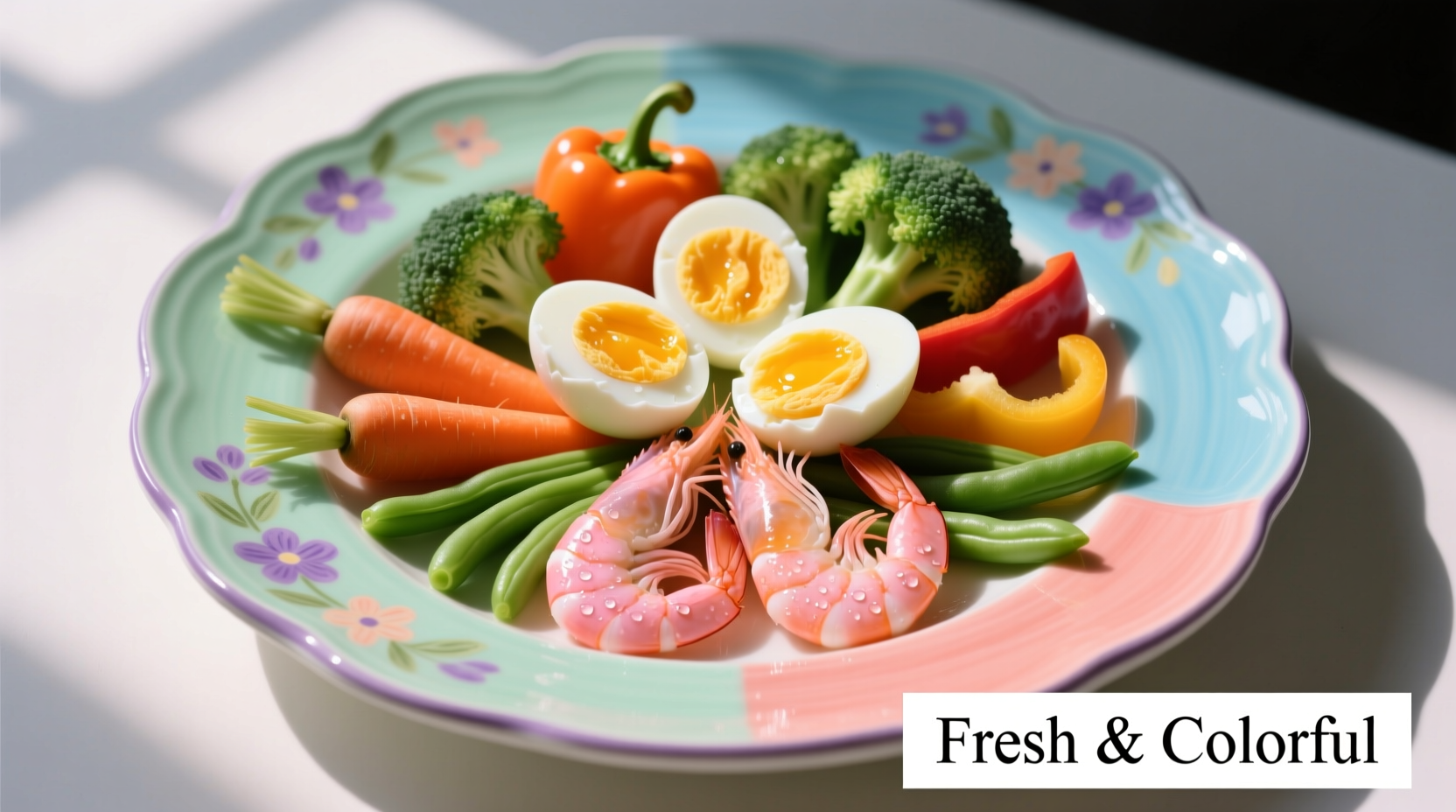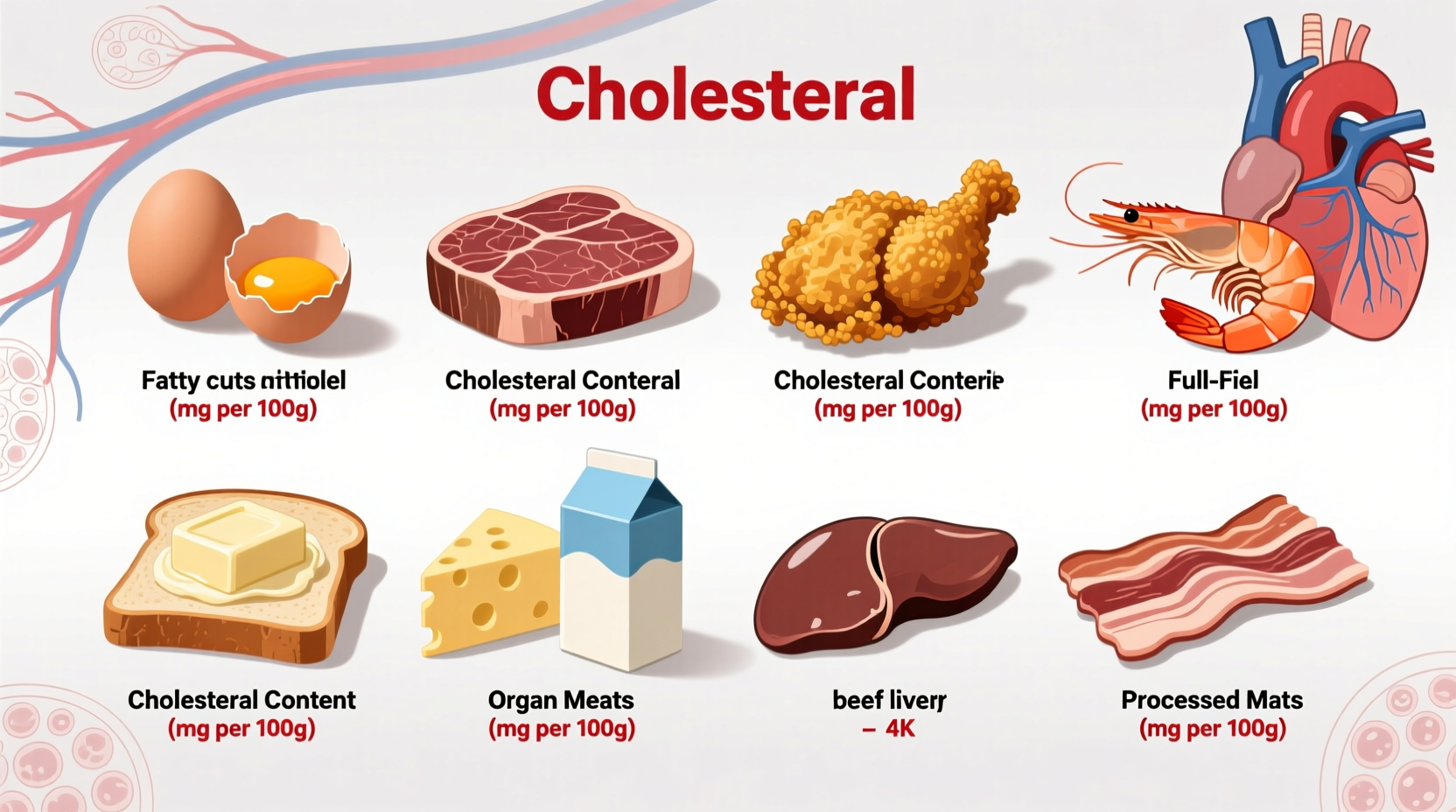Egg yolks, organ meats (like liver), shellfish (especially shrimp), full-fat dairy products, and processed meats contain the highest levels of dietary cholesterol. While dietary cholesterol has less impact on blood cholesterol than saturated and trans fats, moderation remains important for heart health according to current American Heart Association guidelines.
Understanding which foods contain high cholesterol helps you make informed dietary choices without unnecessary restriction. Recent research shows that for most people, dietary cholesterol has a smaller impact on blood cholesterol levels than previously believed—but certain high-cholesterol foods often come packaged with saturated fats that do significantly affect heart health. This guide provides evidence-based information about high-cholesterol foods, their nutritional context, and practical guidance for balanced eating.
Understanding Dietary Cholesterol vs. Blood Cholesterol
Many people confuse dietary cholesterol (found in food) with blood cholesterol (measured in medical tests). These are distinctly different:
- Dietary cholesterol comes exclusively from animal products and has moderate impact on blood cholesterol for most people
- Blood cholesterol levels are more significantly affected by saturated and trans fats than by dietary cholesterol
- Genetic factors play a major role in how individuals process dietary cholesterol
The 2020-2025 Dietary Guidelines for Americans removed specific limits on dietary cholesterol, recognizing that for most people, moderate consumption doesn't substantially raise heart disease risk. However, certain populations—like those with diabetes or familial hypercholesterolemia—may need to monitor intake more carefully.
Top High-Cholesterol Foods and Their Nutritional Context
Not all high-cholesterol foods are created equal. Some provide valuable nutrients alongside their cholesterol content, while others offer little nutritional benefit. This comparison helps you make informed choices:
| Food | Cholesterol (per serving) | Nutritional Benefits | Recommended Intake |
|---|---|---|---|
| Egg yolks (1 large) | 186 mg | High-quality protein, choline, lutein | Up to 1 daily for most people |
| Beef liver (3 oz) | 331 mg | Extremely high in vitamin A, iron, B12 | Occasionally (1-2x monthly) |
| Shrimp (3 oz) | 166 mg | Lean protein, selenium, omega-3s | Regularly in moderation |
| Butter (1 tbsp) | 31 mg | Minimal nutritional value | Limit significantly |
| Cheddar cheese (1 oz) | 30 mg | Calcium, protein | Moderate portions |
Source: USDA FoodData Central (2023) https://fdc.nal.usda.gov/
When High-Cholesterol Foods Might Fit Your Diet
Context matters significantly when evaluating high-cholesterol foods. The American Heart Association emphasizes that overall dietary patterns matter more than single nutrients:
- Nutrient-dense options like eggs and shellfish provide valuable nutrients alongside cholesterol and can be part of healthy eating patterns
- Processing level matters—whole food sources are preferable to processed versions containing added saturated fats
- Individual health status determines appropriate intake—those with certain genetic conditions may need stricter limits
- Overall dietary pattern is crucial—high-cholesterol foods fit better in diets rich in fruits, vegetables, and whole grains
Research published in the American Journal of Clinical Nutrition shows that for approximately 70% of the population, dietary cholesterol has minimal impact on blood cholesterol levels. The remaining 30% ("hyper-responders") may experience more significant effects, highlighting why personalized nutrition guidance is valuable.
Making Practical Dietary Choices
Instead of focusing solely on cholesterol content, consider these evidence-based strategies for heart-healthy eating:
- Prioritize whole foods over processed options—choose grilled shrimp instead of fried shrimp cocktails
- Balance high-cholesterol foods with cholesterol-lowering options like oats, beans, and fatty fish
- Watch saturated fat content—this has greater impact on blood cholesterol than dietary cholesterol itself
- Practice portion control—a small serving of liver provides nutrients without excessive cholesterol
- Consider preparation methods—boiled eggs have the same cholesterol as fried eggs but without added fats
Registered dietitians often recommend the Mediterranean diet pattern, which includes moderate amounts of certain high-cholesterol foods like eggs and fish while emphasizing plant-based foods. This approach has been shown in multiple studies to support heart health better than strict cholesterol restriction alone.

Common Misconceptions About Dietary Cholesterol
Several persistent myths create unnecessary confusion about cholesterol in food:
- Myth: All high-cholesterol foods are bad for heart health
Reality: Many high-cholesterol foods like eggs and shellfish offer valuable nutrients with minimal impact on blood cholesterol for most people - Myth: Dietary cholesterol directly translates to higher blood cholesterol
Reality: Saturated and trans fats have significantly greater impact on blood cholesterol levels than dietary cholesterol - Myth: Everyone should avoid egg yolks
Reality: For most people, one whole egg daily fits within healthy eating patterns and provides important nutrients
The evolution of cholesterol guidelines reflects improved scientific understanding. Whereas previous guidelines recommended strict limits (under 300mg daily), current guidance focuses on overall dietary patterns rather than isolated nutrients. This shift acknowledges that foods exist within complex nutritional matrices that affect how our bodies process them.











 浙公网安备
33010002000092号
浙公网安备
33010002000092号 浙B2-20120091-4
浙B2-20120091-4